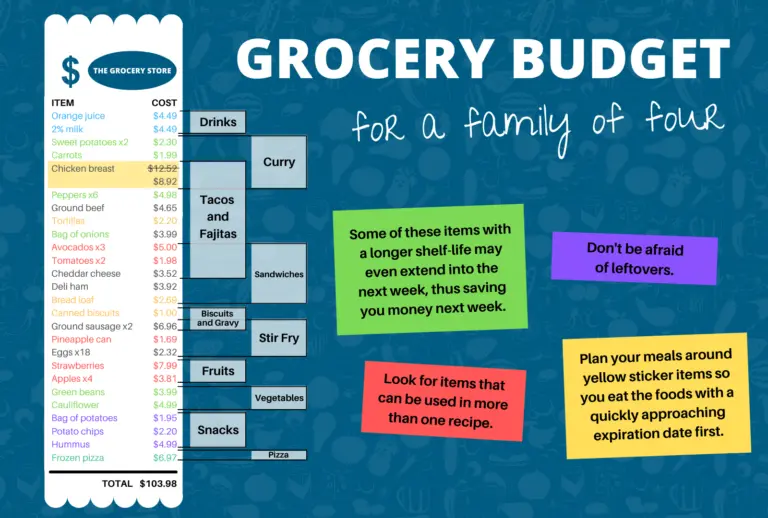How to buy family groceries for under $350/month
A few clever hacks to make grocery shopping on a budget easy peasy lemon squeezy. We’re all about keeping it a cost-friendly affair.
Buying groceries while sticking to a budget is one of the most underrated skills. It takes patience, a keen eye, and a side of smartness to get groceries for a family without blowing away an entire paycheck. Regardless of how many members there are in your household, it is important to have a budget in mind before you hit the grocery aisles at your favorite store. It is helpful if you plan out your meals in advance and start adding the ingredients to your shopping list.
Meal prepping saves time during the weekdays and gives you an estimate of how many meals you need to prepare for the whole week. You can even break it down to servings and calculate how many servings of an item each family member usually consumes. For instance, a grocery budget for a family of four should be enough to cover 84 meals, assuming each member consumes 3 meals a day. It should also have some legroom for snacks. There are recipes galore on the internet that help you devise meal plans for your family without overspending.
We’ve put together a list of tips that have been phenomenal in budgeting groceries. Let’s explore the following:
1. Never shop on an empty stomach
Make this your number 1 rule. When you shop on an empty stomach, you’re way more likely to pick up an unhealthy snack at the checkout aisle. Always make sure to eat something filling to keep hunger away for a couple of hours. Shopping can be exhausting especially if you’re trying to stay under budget. It requires planning and calculation and isn’t as simple as loading your cart and heading towards checkout. You are constantly using your brain to make assessments towards a buying decision. All this work is bound to burn calories and aggravate hunger, and you might find yourself at the nearest drive-thru, loading up on burgers and fries.
2. Plan meals with cheaper ingredients
Meal prepping can be as expensive as you want it to be. But if caviar isn’t on your list, you’ll probably be able to save money on groceries. Eggs are cheap. Incorporating them in your plan more often is a good way to save money. Rice and pasta can make up a large part of your meals and neither of them are super pricey. Adding beans to a few dinners is another great tip. In fact, we have a few recipes that scream delicious but are on the cheaper side.

Also, there are ways to stretch out your meals. Nifty homemakers use leftover turkey to make sandwiches the next day. Leftover vegetables and meat can be used to cook fried rice for lunch.
3. Always look out for the yellow stickers
Just because a food item (especially meat) has a yellow discounted sticker on it, doesn’t mean it’s gone rancid. Stores would be eyeballs-deep in lawsuits if they sold rotten food to their customers. A discounted price means it will have to be used within a short time frame. A shorter than usual shelf life shouldn’t be a deterrent. You can always use them up the same day or freeze them for longer. This is one smart way to buy things at a cheaper rate.
This is what a receipt for groceries looks like when you shop smart and get the deals.

4. How much does it cost per oz?
This tends to be overlooked as labels trick the eye to look at the final price. While something may have a lower price, it might be costing you more per unit or per ounce than a brand with a higher price. It’s one of the most important hacks when shopping for groceries. The cost per oz is what you compare when choosing between brands to make an informed decision.
5. Watch out for sneaky techniques
Always know that corporations have a lot of strategic people at the top and sometimes, they’re not above creating a false sense of savings. For instance, when an item comes with a huge label that says 33% extra or $3 off, it could be a ploy to distract you from their cost per ounce or cost per unit number. Be aware of such tactics and remember to check the price tags carefully.
6. Shop generic
The battle between name brands and store brands has been going on for years. It is natural to have a favorite brand of soda or candy. But items like flour, sugar, salt, spices etc. have a different story. Always try to compare brands to see what gets you the best deal. Rachel Ray has given us reasons to shop generic, and who are we to argue? The name brands cost more than store brands because you’re not paying just for the product. You’re paying towards advertising, marketing campaigns, promotions, celebrity endorsements, and development costs.
7. Buy few items in bulk
Buying in bulk cuts costs. So, hit your local Costco or Sam’s Club to buy items in larger quantities. They could be snacks, pasta, cereal, rice, or pretty much anything that you use a lot in your household. Just be sure to check the expiration dates and storage instructions.
8. Avoid pre-cut fruit and veggies
We know that life gets busy, and we like to avail every convenience we can. But how much more are you willing to pay to eliminate a few minutes of chopping time? If you compare the cost/ounce of whole fruit and veggies against pre-cut options, you’ll be shocked at the difference. Pre-cut fruit and veggies may have preservatives to enhance shelf life. How else do they keep apple slices from turning yellow? Also, pre-chopped fruit and vegetables have a higher risk of contamination. Our verdict: Whole fruit is the way to go!
9. Stock up when something is on sale
This is an essential hack that costs you more upfront, but it saves you a lot of money in the long run. Canned goods and meat are prime examples. But it could be any food item that your family consumes a lot and has a decent shelf life. Keep an eye out for sales in your area, and you won’t be disappointed.
Smart shopping is a life skill we all need to develop. Nobody likes to pay more when a few simple tricks can save you a lot. Regardless of your financial situation, shopping on a budget will benefit you greatly. It enables you to be conscious of your purchase and eliminates wastefulness. You gain a deeper understanding of how stores work and how to make them work to your advantage. Best of all, your family can enjoy home cooked meals without having to compromise on other aspects of life. There are secret ways to spend less on groceries to save your family money each week. Just think of all the amazing things you could do with the extra cash. If that isn’t motivation enough, we don’t know what is!
This blog was posted on October 3, 2017, but has since been updated.
